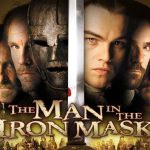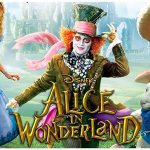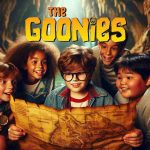“The Time Machine (2002)”
- movieslovers
- November 20, 2024

Review of The Time Machine (2002)
General Information
- Director: Simon Wells
- Main Cast:
- Guy Pearce (Alexander Hartdegen)
- Samantha Mumba (Weena)
- Jeremy Irons (Morlock)
- Mark Addy (Philby)
- Orlando Jones (Mr. Skinston)
- Genre: Sci-Fi, Adventure
- Runtime: 96 minutes
- Studio: DreamWorks Pictures
Plot
The Time Machine is a loose adaptation of H.G. Wells’ 1895 novella of the same name. The film follows Alexander Hartdegen (Guy Pearce), a brilliant but grief-stricken scientist in Victorian-era New York, who invents a machine capable of traveling through time. After the tragic death of his fiancée, Emma (Sienna Guillory), Alexander is consumed with guilt and attempts to use the time machine to change history, hoping to prevent her death.
His repeated attempts lead him far into the future, where humanity has evolved into two distinct races: the peaceful Eloi, who live above ground in a bright and simple society, and the monstrous Morlocks, who dwell in the dark and feed off the Eloi. As Alexander journeys through time, he confronts moral dilemmas about the potential consequences of meddling with history, while also fighting to protect the Eloi and uncovering the secrets of the future.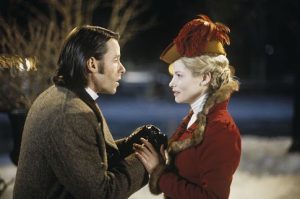
Highlights
- Guy Pearce’s Performance
- Guy Pearce delivers a solid performance as Alexander Hartdegen, capturing the character’s grief, intellect, and determination. His portrayal of a man driven to alter time in the hopes of preventing a personal tragedy provides the emotional core of the film. Although the film doesn’t dive as deep into his character’s emotional complexity as it could, Pearce’s performance grounds the narrative and allows the audience to sympathize with his quest.
- Visual Effects and Time Travel
- The film’s time travel sequences are visually striking, especially in the early scenes where Alexander tests his machine and ventures into the future. The time travel effects—depicting the rapid passage of centuries and the evolution of the world—are impressive, though they can sometimes feel a bit dated compared to today’s CGI standards. Nonetheless, the film’s futuristic setting is engaging, with imaginative depictions of both the Eloi society and the Morlocks’ subterranean world.
- The Eloi and Morlock World
- The film creates a visually captivating divide between the Eloi, a peaceful, idyllic race living above ground, and the more dangerous, subterranean Morlocks. The contrast between the two societies plays a key role in the story’s themes of human evolution and the consequences of technological progress. The Eloi, despite being portrayed as a utopian society, are presented as somewhat helpless, while the Morlocks serve as a darker reflection of human nature and survival instincts.
- Themes of Time and Consequence
- At its core, The Time Machine explores the ethical dilemmas and consequences of manipulating time. Alexander’s attempts to rewrite history—despite his best intentions—serve as a cautionary tale about the limits of human control and the ripple effects of changing the past. The film’s exploration of loss, regret, and the passage of time resonates throughout, even if the philosophical elements feel a bit underexplored in favor of action sequences.
- Production Design
- The film’s production design, especially in the future segments, is ambitious. The Eloi’s utopian city is beautifully realized, with bright, open spaces that contrast sharply with the dark, gritty underground lairs of the Morlocks. The futuristic aesthetics, though stylized, help immerse the audience in a world far removed from the Victorian past that Alexander originally inhabits.
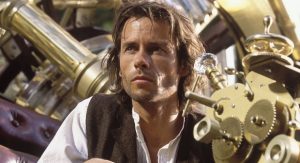
- The film’s production design, especially in the future segments, is ambitious. The Eloi’s utopian city is beautifully realized, with bright, open spaces that contrast sharply with the dark, gritty underground lairs of the Morlocks. The futuristic aesthetics, though stylized, help immerse the audience in a world far removed from the Victorian past that Alexander originally inhabits.
Criticisms
- Pacing and Shallow Plot
- The Time Machine suffers from pacing issues in the second half. While the first act sets up the emotional stakes and introduces the time travel concept effectively, the film becomes somewhat bogged down in exposition and action sequences as Alexander ventures further into the future. The emotional and philosophical weight of the narrative sometimes gets lost in the spectacle of time travel and futuristic battles.
- Underdeveloped Characters
- While Guy Pearce gives a solid performance as Alexander, many of the other characters feel underdeveloped. Samantha Mumba’s role as Weena, the Eloi woman who befriends Alexander, is relatively shallow, and the relationship between her and Alexander doesn’t feel as emotionally significant as it should. The Eloi as a whole lack depth, and the Morlocks, while threatening, are more symbolic of humanity’s darker instincts than fully realized characters.
- Predictability and Lack of Depth
- The film’s plot follows a somewhat predictable trajectory, especially if you’re familiar with the source material. While the time travel elements are intriguing, the film doesn’t explore the philosophical aspects of time and consequence as deeply as it could. The ending, while fitting, feels more like a resolution to the action rather than a thoughtful exploration of the themes it raises.
- Visual Effects Are Dated
- While the visual effects were impressive at the time of release, some of the time travel sequences and futuristic landscapes have not aged as well. The film’s use of CGI, particularly in the scenes with the Morlocks, feels somewhat dated by today’s standards, which could pull some viewers out of the experience.

- While the visual effects were impressive at the time of release, some of the time travel sequences and futuristic landscapes have not aged as well. The film’s use of CGI, particularly in the scenes with the Morlocks, feels somewhat dated by today’s standards, which could pull some viewers out of the experience.
Verdict
The Time Machine (2002) is a visually engaging and action-driven adaptation of H.G. Wells’ classic novel. Guy Pearce’s performance, combined with impressive set designs and the central theme of time travel, provides a strong foundation for the film. However, the film’s pacing issues, underdeveloped characters, and lack of deep philosophical exploration detract from its full potential. While it offers an entertaining and visually captivating experience, it doesn’t reach the emotional or intellectual depth that the source material and concept might warrant.
Rating: 8/10



